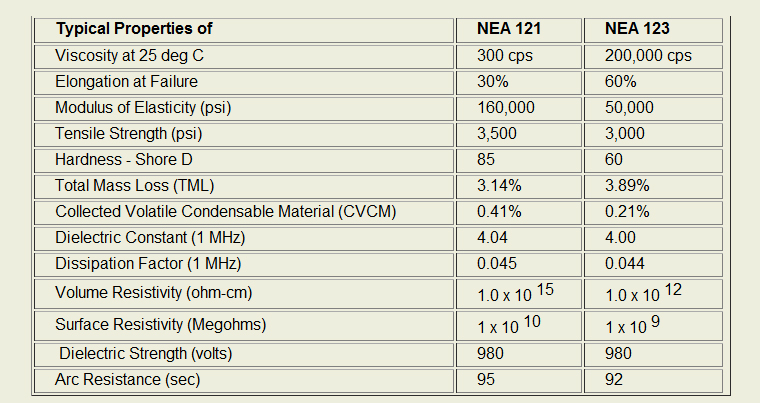- Home
- UV cured adhesives
- Acrylates
- Norland UV adhesives
- Electronic adhesives
- Norland NEA 121-123
Norland NEA 121-123
Norland Electronic Adhesives 121 and 123 (NEA 121 and NEA 123) are single component adhesives that cure tack free in seconds to a tough, resilient polymer when exposed to ultraviolet light. NEA 121 is a low viscosity liquid, and NEA 123 is a thixotropic paste. They are recommended as an extremely fast and efficient way to tack, fill, seal or bond precision components or wires in place. With this system, a drop of adhesive is used to form a bridge between the component or wire, and the substrate. Exposure to UV light quickly cures them, and holds the component in place. Useful applications for NEA 121 and 123 include wire tacking, chip capacitor bonding, coil termination, bonding of head gimbal assemblies and tamper proofing adjustable components.
The unique advantage of these adhesives is that even though they cure in seconds, they are extremely stable when not exposed to ultraviolet light. Norland 121 and 123 are sensitive to the whole range of UV light from 320 to 380 nanometers with peak sensitivity around 365 nanometers. Cure time is dependent on light intensity and thickness of adhesive layer. The adhesives have been designed to be spot cured in small areas with hand held or desk top UV light sources that are safe and easy to use.
Faster cure times are possible with medium pressure vapor lamps (typically 200 watts/linear inch). These are most commonly used in conveyorized applications because the light must be shielded from the operator.
In addition to the UV cure, Norland 121 and 123 contain a latent heat catalyst that can quickly cure areas that do not see the ultraviolet light. The catalyst allows the adhesive to cure in 10 minutes at 125 degrees C in a convection oven, or 3 hours at 80°C. Faster cure times are possible with infrared ovens. Temperatures less than 60 deg C will not appreciably activate the adhesive. The advantage of the heat cure is to bring partially cured adhesive to full cure to get the maximum physical properties of the adhesive. The heat cure is not required if the entire adhesive receives proper exposure to UV light.
NEA 121 and 123 have very good adhesion to glass, metals, printed circuit boards and many plastics. Since, the cure is very exothermic, the adhesive should be allowed to cool back to room temperature before adhesive testing begins. Components bonded with NEA 121and NEA 123 can withstand temperature conditions from -150° C to 150°C.

To remove uncured adhesive from substrate use an acetone or alcohol moistened cloth. The cured adhesive can be removed by prying the drop with a knife edge or soaking in a solvent combination of 90 parts methylene chloride and 10 part methanol.
Handling and Storage Precautions
CAUTION: Norland Electronic Adhesive 121 and 123 may cause skin irritation and prolonged contact with skin should be avoided. If contact occurs wash well with soap and water. Use in well ventilated area.
Store in a cool dark place. CAUTION: Do not freeze material. Never expose the bulk material to high heat or ultraviolet light. It can generate an extremely exothermic reaction.
